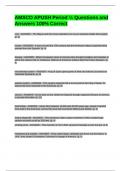-
1. Exam (elaborations) - Apush amsco practice examination study guide with complete solutions
-
2. Exam (elaborations) - Apush amsco chapter 1 & 2 quiz with complete questions and answers
-
3. Exam (elaborations) - Apush: amsco unit 1 questions and answers (graded a)
-
4. Exam (elaborations) - Amsco apush multiple choice practice examination with 100% correct answers
-
5. Exam (elaborations) - Amsco apush chapter 1-15 questions and answers 100% correct
-
6. Exam (elaborations) - Apush review exam period 1-3, amsco flag book chapters 1-6 questions and answers 100%...
-
7. Exam (elaborations) - Amsco apush book ch. 1: multiple choice questions and answers (100% accurate)
-
8. Exam (elaborations) - Amsco ap us history topics 2.2-2.7 with complete questions and answers
-
9. Exam (elaborations) - Apush amsco unit 1 (chapters 1-4) questions and answers 100% correct
-
10. Exam (elaborations) - Apush amsco period 1 questions and answers 100% correct
-
11. Exam (elaborations) - Amsco period 9 apush questions and answers 100% accurate
-
12. Exam (elaborations) - Amsco apush period ½ questions and answers 100% correct
-
13. Exam (elaborations) - Amsco apush unit 4 questions and answers (graded a)
-
14. Exam (elaborations) - Apush amsco chapter 1 multiple choice questions and answers 100% correct
-
15. Exam (elaborations) - Apush amsco quiz chapters 12-15 questions and answers 100% correct
-
16. Exam (elaborations) - Apush amsco main points of unit 6 (6.3 and 6.4) with complete solutions
-
17. Exam (elaborations) - Apush unit 6 amsco questions review questions and answers 100% correct
-
18. Exam (elaborations) - Apush review amsco chapter 1-13 questions and answers (graded a)
-
19. Exam (elaborations) - Apush: amsco unit 3 questions and answers 100% correct
-
20. Exam (elaborations) - Amsco 4.4 apush key terms with complete solutions
-
21. Exam (elaborations) - Apush: amsco unit 2 questions and answers (graded a)
-
22. Exam (elaborations) - Apush amsco chapter 3 & 4 quiz with complete solutions
-
23. Exam (elaborations) - Apush- amsco period 6 questions and answers 100% correct
-
24. Exam (elaborations) - Amsco chapter 1 & 2 review guide with complete solutions
-
25. Exam (elaborations) - Apush amsco unit 3/period 3 terms 1754-1800 with complete solutions
-
26. Exam (elaborations) - Apush unit 6 amsco multiple choice questions with correct answers
-
27. Exam (elaborations) - Apush amsco 8.10-8.12 questions and answers 100% correct
-
28. Exam (elaborations) - Amsco apush chapter 8 (4.5-4.6) questions and answers 100% verified
-
29. Exam (elaborations) - Amsco period 7 multiple choice questions and answers 100% verified
-
30. Exam (elaborations) - Apush chapter 3 amsco questions and answers (graded a)
-
31. Exam (elaborations) - Apush amsco main points of unit 6 (6.5 and 6.6) with complete solutions
-
32. Exam (elaborations) - Amsco apush chapter 7 (4.1-4.4) with complete questions and answers
-
33. Exam (elaborations) - Chapter 6 & 7 apush amsco questions and answers 100% correct
-
34. Exam (elaborations) - Apush amsco ch.4-6 multiple choice questions and answers 100% verified
-
35. Exam (elaborations) - Amsco apush chapter 16 (6.5-6.6) questions and answers (graded a)
-
36. Exam (elaborations) - Apush amsco chapter 1 summary & notes
-
37. Exam (elaborations) - Apush amsco main points of unit 4 (4.3 and 4.4) with complete solutions
-
38. Exam (elaborations) - Amsco apush chapter 2 and 3 complete questions and answers
-
39. Exam (elaborations) - Apush amsco chapter 22 questions and answers 100% correct
-
40. Exam (elaborations) - Amsco apush unit 2 questions and answers 100% correct
-
41. Exam (elaborations) - Apush amsco main points of unit 6 (6.7 and 6.8) with complete solutions
-
42. Exam (elaborations) - Amsco apush chapter 15 (6.1-6.4) questions and answers (graded a)
-
43. Exam (elaborations) - Amsco apush chapter 25 with complete questions and answers
-
44. Exam (elaborations) - Apush amsco period 3 questions and answers 100% verified
-
45. Exam (elaborations) - Amsco ap us history chapter 1 with complete questions and answers
-
46. Exam (elaborations) - Amsco ap us history chapter 23 questions and answers 100% correct
-
47. Exam (elaborations) - Amsco apush unit 6 questions and answers 100% correct
-
48. Exam (elaborations) - Apush amsco chapter 18 questions and answers 100% correct
-
49. Exam (elaborations) - Apush amsco chapter 12-13 key term with complete solutions
-
50. Exam (elaborations) - Amsco ap us history chapter 12 with complete solutions
-
51. Exam (elaborations) - Amsco ap us history chapter 3 questions and answers 100% accurate
-
52. Exam (elaborations) - Amsco apush chapter 17 (6.7-6.13) questions and answers 100% correct
-
53. Exam (elaborations) - Apush amsco chapter 3 vocab with complete solutions
-
54. Exam (elaborations) - Amsco ap us history chapter 7-11 with complete questions and answers
-
55. Exam (elaborations) - Amsco apush chapter 16 questions and answers 100% correct
-
56. Exam (elaborations) - Apush amsco chapter 20 key terms with complete solutions
-
57. Exam (elaborations) - Amsco apush ch. 8 questions and answers (graded a)
-
Show more




